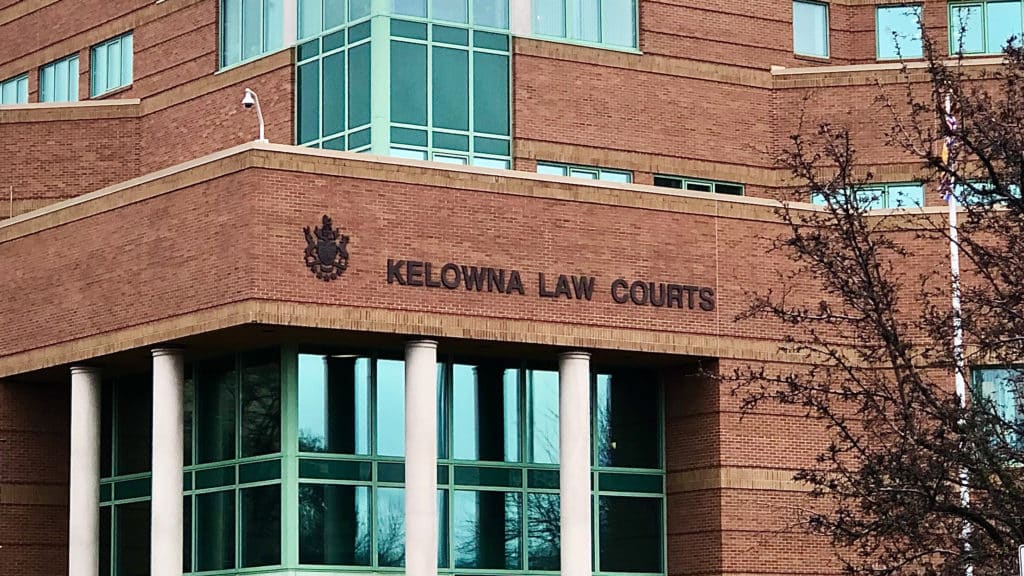
Alex, an Indigenous youth, says they were “horrified” to learn that Robert Riley Saunders pleaded guilty yesterday to just three criminal charges — including fraud and breach of trust — considering the former social worker was facing a total of 13 charges.
Saunders was employed by B.C.’s Ministry of Children and Family Development (MCFD) between 1996 and 2018, serving as a child protection worker and a guardianship worker.
Alex — whose real name we’re withholding due to a court-ordered publication ban that prohibits anyone from sharing information that could identify victims in this case — says Saunders was one of their social workers when they were in the B.C. government’s care and receiving support to live independently in Kelowna, between 2010 and 2012.
“He wasn’t my direct guardianship worker, but he was the guy who took on my case when my social worker was unavailable, which was quite often,” they say.
In December 2020, Saunders was charged with “ten counts of fraud over $5,000, one count of theft over $5,000, one count of breach of trust and one count of uttering a forged document,” according to the B.C. RCMP.
Yesterday he pleaded guilty to one of the fraud counts, as well as “breach of trust in connection with his duties as a child protection guardianship worker” and “causing the Province of BC to act on a forged document.”
His sentencing hearing is set to begin on March 21.
What about the other ten charges?
A spokesperson for the B.C. Prosecution Service (BCPS) tells IndigiNews they anticipate the other ten charges “will be stayed once the sentencing on the three charges is concluded.”
IndigiNews asked defense lawyer Michael Patterson of Bridge Law to explain what it means to “stay” a charge.
“It means that the Crown has decided not to proceed with a charge,” he says.
Alex says this news is “super frustrating.”
“Ideally, he would be charged for every single account of child abuse that’s happened,” they say. “I feel like it’s a dance to escape the responsibility, like he doesn’t want to acknowledge the damage that he’s done to all the kids in his care.”
The news feels especially hurtful given the fact that Sept. 30, the first National Day for Truth and Reconciliation in Canada, is just around the corner, Alex adds.
“A lot of these youth, myself included, were victims of intergenerational residential school abuse,” Alex says. “They need to be treated with respect … ‘Every child matters’ needs to include every child, especially the victims of this guy.”
Asked why the BCPS anticipates the remaining charges will be stayed, a spokesperson wrote: “There will be no further comment on the process at this time.”
Patterson says this isn’t necessarily a bad sign for the alleged victims in this case.
“Guilty pleas are normally a compromise between the Crown and the defense lawyers,” he says. “Sometimes these compromises are worth it, given what the victims will have to go through to testify … It saves the complainants from giving testimony, repeating the traumas that they’re suffering.”
It also “saves taxpayers money because it reduces court time,” he points out.
Accused of stealing from more than 100 — mostly Indigenous — kids
Patterson is one of several lawyers involved in separate civil suits against Saunders and MCFD. He says he’s acting on behalf of several plaintiffs — including Alex — who have sued Saunders and MCFD with respect to “issues ranging from neglect to misappropriation of funds that were targeted for their care.”
Last year, MCFD settled a class action in which Saunders was accused of stealing basic living allowances from more than 100 — mostly Indigenous — kids, while working as their government-appointed guardian, according to court documents submitted during the class action hearing.
These documents also show that Saunders faked credentials on his résumé, claiming to hold a social work degree from the University of Manitoba, when he didn’t in fact have one.
“The Province admits that Saunders harmed children in the Director’s care for whom he had responsibility in his capacity as a social worker and that the Province is vicariously liable for the harm caused by Saunders,” reads the settlement agreement.
“This harm includes neglect, misappropriation of funds and failure to plan for the children’s welfare and, with respect to Indigenous children, failure to take steps to preserve their cultural identities.”
Through the class action, Indigenous youth who were in Saunders’ care for at least 90 days are entitled to a basic payment of $69,000, plus additional money for additional harms they may have incurred — up to a maximum of $250,000.
Alex wants people to know that money doesn’t resolve trauma.
“A lot of us have gotten compensation, but that doesn’t take away our trauma that we feel,” they say.
“I have to do therapy with my son because I need to learn how to be a parent and fix my life, you know? The media’s not covering just how many of his victims are addicted to drugs, or sexually exploited, or dead [or] homeless — people aren’t thinking about that.”
IndigiNews is committed to trauma-informed reporting, which involves taking time and care, transparency and creating safety plans for those who come forward with stories to share. Brielle Morgan is a white journalist living on the unceded territory of the xʷməθkwəy̓əm (Musqueam), Skwxwú7mesh (Squamish), and Səl̓ílwətaɬ (Tsleil-Waututh) Nations. She strives to work in solidarity with her Indigenous colleagues and uphold trauma-informed practices. See examples of her past reporting on the child-welfare system here and here.



